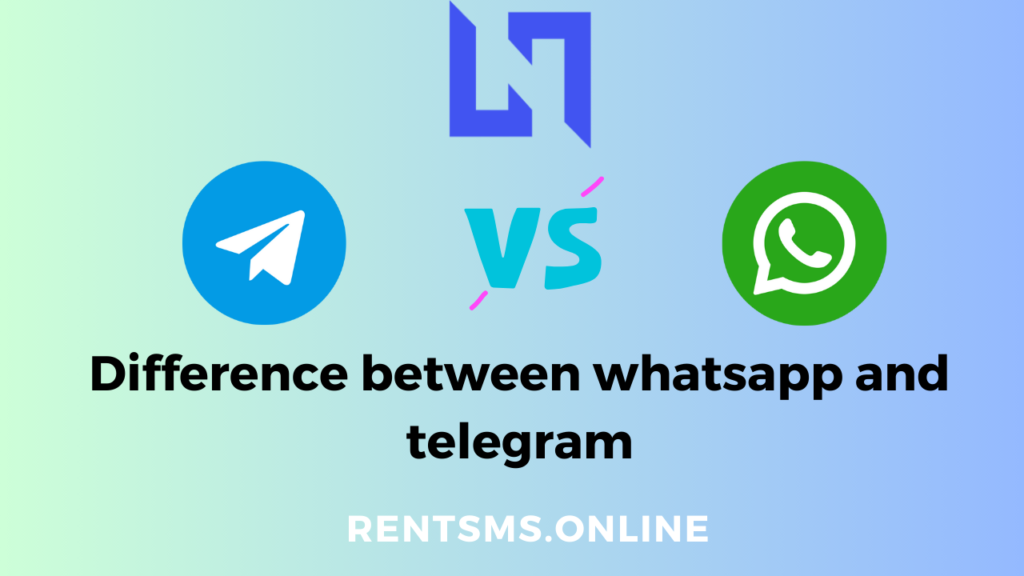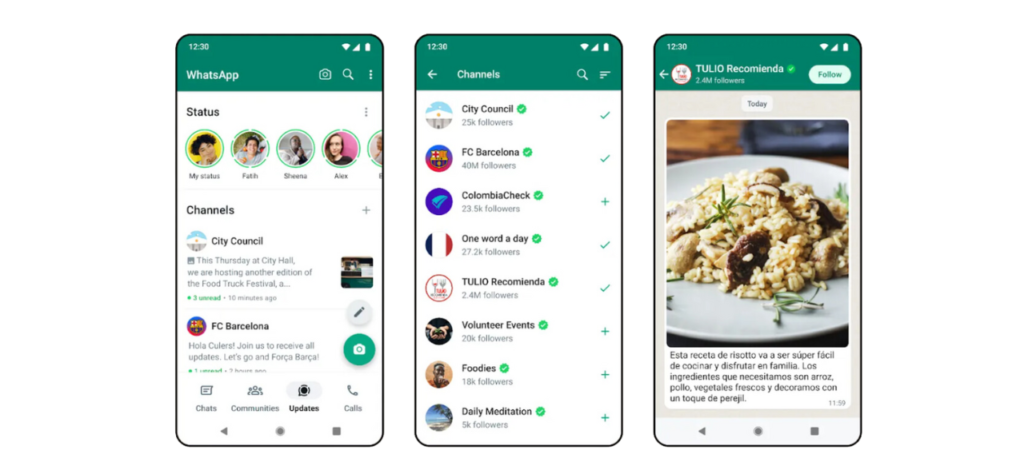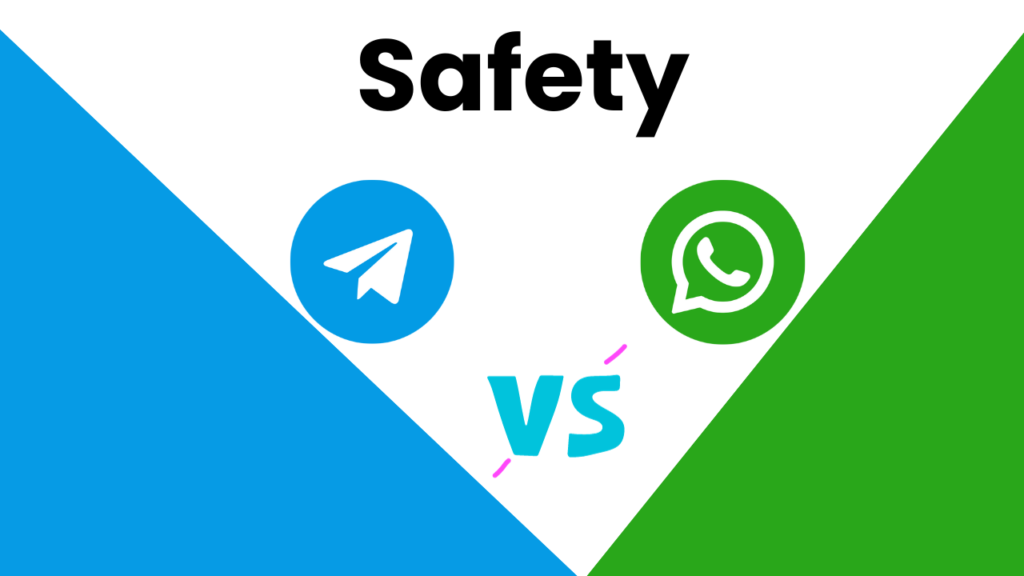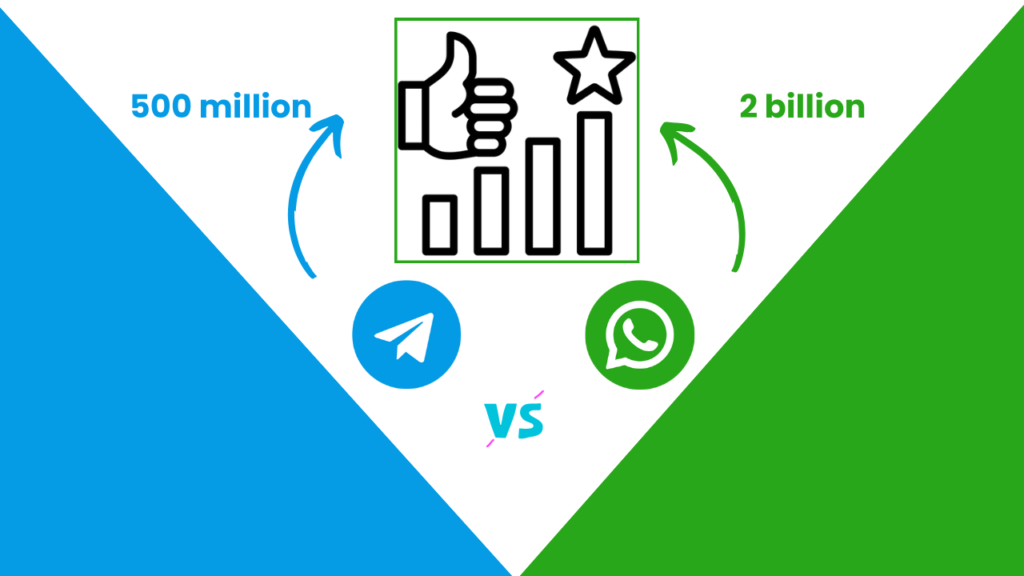
Table of Contents
Which is better Telegram or WhatsApp?
In the WhatsApp vs. Telegram debate, your choice should align with your priorities. WhatsApp is the go-to for user-friendliness and reliability, with a massive user base, while Telegram shines with its customization and privacy features. Whether you value end-to-end encryption, extensive features.
Here’s a simplified Key Takeaway Table highlighting the differences between WhatsApp and Telegram:
| Aspect | Telegram | |
|---|---|---|
| User Base | Over 2 billion users globally | Around 500 million users, growing steadily |
| Encryption | Default end-to-end encryption | Selective end-to-end encryption in Secret Chats |
| Features | User-friendly, simple interface | Extensive features including supergroups, bots |
| Customization | Limited customization options | Highly customizable, allowing themes and bots |
| File Sharing | Limited file size, stored locally | Generous file sharing, cloud storage options |
| Privacy Options | Basic privacy settings | Advanced privacy controls, self-destructing messages |
| Business Solutions | WhatsApp Business for enterprises | Telegram for Business, suitable for small to large businesses |
| Platform Support | Available on various platforms | Third-party app integration possible, wide platform support |
| Popularity | Extremely popular worldwide | Rapidly growing user base, especially among privacy enthusiasts |
Remember, your choice between WhatsApp and Telegram should depend on your specific needs, whether it’s a user-friendly interface, advanced privacy features, or extensive customization options.
What is telegram? and what is telegram used for?

What is telegram?
Telegram is a popular messaging application that allows users to send and receive messages, multimedia content, and conduct voice and video calls. It serves as a digital platform for real-time communication, similar to other messaging apps. What sets Telegram apart is its strong emphasis on user privacy and data security. The application offers end-to-end encryption in its “Secret Chats,” ensuring that messages remain private and secure, making it a favored choice for individuals who prioritize confidentiality.
What is telegram Used For?
Telegram serves a variety of purposes, making it a versatile messaging app. It is primarily used for personal communication, enabling people to stay in touch with friends and family through text and voice messages. Telegram’s user-friendly interface and robust features make it a convenient choice for day-to-day conversations.
Beyond personal use, Telegram is also utilized for group communication. Users can create and join groups centered around shared interests, hobbies, or professional topics. The app’s supergroups and channels feature makes it ideal for hosting discussions, sharing information, and collaborating with larger groups of people.
Moreover, Telegram is employed as a platform for news dissemination and updates. Channels on Telegram are used by news organizations, businesses, and content creators to reach a wider audience quickly. These channels allow users to stay informed about the latest developments in their areas of interest.
In summary, Telegram is not only a secure and private messaging tool for personal communication but also a versatile platform for group interactions, information sharing, and news delivery. Its commitment to user privacy and a broad range of features have made it a valuable application for diverse communication needs.
You can check our step by step guide on how to create Telegram account without phone number.
what is WhatsApp? and what is WhatsApp used for?

What is WhatsApp?
WhatsApp is a popular and user-friendly messaging application that facilitates real-time communication through text messages, voice messages, and multimedia content. It has gained widespread recognition for its reliability and straightforward interface, making it accessible to users of various ages and technological backgrounds. WhatsApp’s primary focus is on personal communication, enabling people to stay connected with friends, family, and acquaintances.
What is WhatsApp Used For?
WhatsApp is used for a multitude of purposes, serving as a versatile communication tool. It is primarily employed for personal communication, allowing users to send text messages, share photos and videos, and conduct voice and video calls with their contacts. People often use WhatsApp to stay in touch with loved ones, coordinate plans, or simply chat with friends.
In addition to personal communication, WhatsApp has found utility in professional and business contexts. It is used by businesses and organizations to interact with customers, provide customer support, and deliver updates or promotions. WhatsApp Business, a dedicated business version, offers features tailored to companies, including automated messaging and the ability to create a business profile.
Furthermore, WhatsApp serves as a convenient platform for group communication. Users can form and participate in group chats, making it easy to collaborate with colleagues, organize events, or keep in touch with a community of individuals who share common interests. The app’s widespread use, coupled with its simplicity, has made it a preferred choice for both personal and professional communication.
In conclusion, WhatsApp is not only a popular tool for personal communication but also a valuable resource for businesses and groups seeking to interact, share information, and engage with a broader audience. Its simplicity and diverse features make it an indispensable platform for various communication needs.
You can check our step by step guide on how to create WhatsApp account without phone number.
is Telegram safer than WhatsApp?

When considering the question, “Is Telegram safer than WhatsApp?” it’s essential to acknowledge that both messaging platforms offer a degree of security, but they do so in slightly different ways. WhatsApp, with its default end-to-end encryption, ensures that only you and the recipient can read your messages. This feature makes it challenging for unauthorized parties to intercept your communications. In contrast, Telegram provides similar encryption, but it’s primarily employed in their “Secret Chats,” which users can initiate for added security.
However, Telegram’s unique approach to cloud storage, where messages and media are stored on their servers, may be a concern for some users who prioritize data control. Ultimately, the answer to whether Telegram is safer than WhatsApp depends on your specific needs and how you prioritize various security features. Both apps take privacy and security seriously, so the “safer” choice largely comes down to your personal preferences.
Telegram vs WhatsApp Popularity

When comparing Telegram and WhatsApp popularity, it’s important to note that both messaging apps have substantial user bases, but WhatsApp has historically held a more dominant position. WhatsApp boasts over 2 billion users worldwide, making it one of the most widely used messaging platforms globally. In contrast, Telegram has over 500 million users and has been gaining popularity, particularly among users who value privacy and customization.
While WhatsApp’s user numbers are significantly higher, Telegram’s growth suggests that it is becoming a more popular choice for those who prioritize certain features, such as security and customizability. The answer to the “Telegram vs WhatsApp popularity” question depends on the specific needs and preferences of the user.
Picture Quality WhatsApp vs Telegram
When comparing picture quality between WhatsApp and Telegram, it’s important to consider how these messaging apps handle images. WhatsApp, in its efforts to save data and ensure quicker uploads and downloads, employs a compression algorithm that reduces the size of images. While this approach has its advantages, it can lead to a slight reduction in image quality.
On the other hand, Telegram takes a different path. It doesn’t compress images as heavily as WhatsApp, resulting in potentially better picture quality. This can be particularly noticeable when sharing high-resolution images, making Telegram a favored choice for those who prioritize image clarity.
The “Picture Quality WhatsApp vs Telegram” debate essentially comes down to your preference. If you’re content with slightly compressed images in exchange for faster sharing, WhatsApp may be your choice. However, if you’re passionate about preserving image quality and don’t mind a slightly slower data transfer, Telegram might be the preferable option.
In the end, your decision should be influenced by your image-sharing habits and how much importance you place on picture quality versus data efficiency.
Telegram vs WhatsApp Video Call Quality
Comparing the video call quality of Telegram and WhatsApp requires considering the strengths and limitations of each platform. WhatsApp is widely known for its dependable and seamless video calling experience, consistently providing high-quality video calls with clear audio and video, which ensures a reliable user experience.
On the other hand, Telegram, while continuously enhancing its video call feature, may not consistently match the top-tier quality of WhatsApp, especially when dealing with low-bandwidth conditions. However, it’s worth noting that Telegram is making continuous strides in improving its video call quality.
For everyday usage, Telegram’s video call quality is increasingly reliable and can certainly meet the needs of most users. The decision between “Telegram vs. WhatsApp video call quality” primarily depends on your personal priorities. If you value consistently high-quality video calls, WhatsApp may be your preferred choice. However, if you prioritize a balance between video call quality and the added privacy and versatility that Telegram offers, it can be a suitable and evolving option.
More Features WhatsApp or Telegram
When it comes to the comparison of features, WhatsApp and Telegram each offer a rich set of tools, but their focus differs. WhatsApp excels in simplicity and user-friendliness, making it a go-to choice for straightforward messaging and sharing. It offers essential features like text and video chats, voice messages, and group communication. In contrast, Telegram stands out for its extensive feature set.
It provides all the core messaging functions but goes further with features such as supergroups, channels, and the ability to send larger files. It also encourages user customization, allowing for a more tailored experience. So, in the “more features WhatsApp or Telegram” debate, Telegram often emerges as the winner, particularly if you appreciate extra features and versatility in your messaging app. Your choice should be based on your specific needs and how you prioritize features.
WhatsApp Vs Telegram For Business
When it comes to choosing between WhatsApp and Telegram for business purposes, it’s essential to consider the unique strengths and features of each platform. WhatsApp offers a dedicated business version called “WhatsApp Business” that is tailored to the needs of small and medium-sized enterprises. It provides tools for creating a business profile, automated messaging, and customer support features. WhatsApp Business has a vast user base, making it an attractive option for reaching a large audience.
On the other hand, Telegram offers “Telegram for Business,” which is a free solution designed for businesses and organizations. It provides features like creating channels and groups for broadcasting messages, sharing updates, and interacting with customers. Telegram for Business is known for its versatility, and it doesn’t come with the cost associated with some of WhatsApp’s business features.
The choice between WhatsApp and Telegram for business depends on the specific needs and scale of your enterprise. WhatsApp offers a more extensive range of business-specific features, making it suitable for businesses of all sizes. Telegram, while not as business-focused, provides a cost-effective solution for smaller businesses and organizations looking for an alternative way to connect with their audience.
Ultimately, your decision should be based on the size of your business, your budget, and the specific features that align with your business goals.
Stay connected! Follow us on our social media platforms for the latest updates and exciting content

